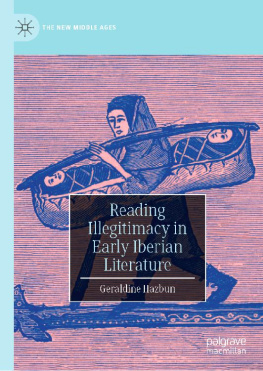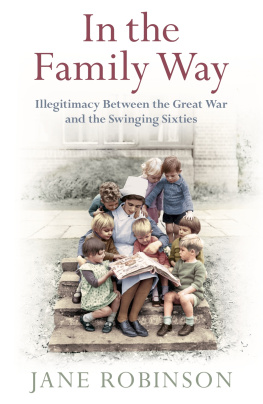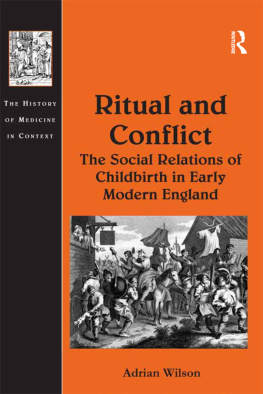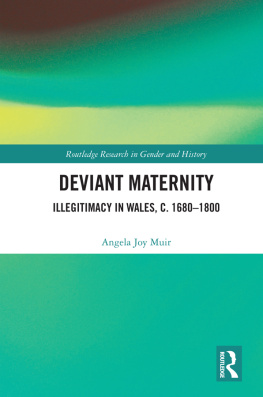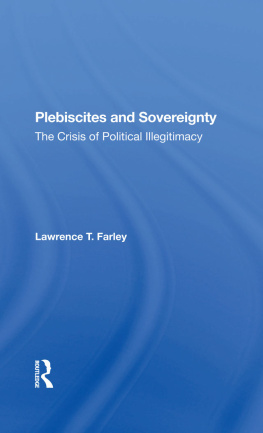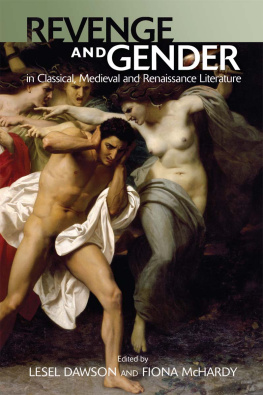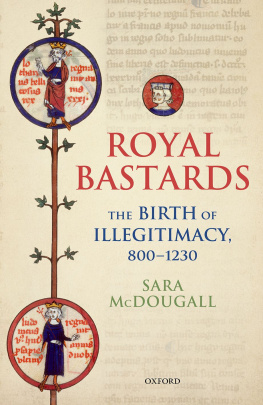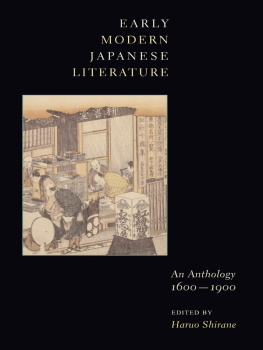The New Middle Ages
Series Editor
Bonnie Wheeler
English and Medieval Studies, Southern Methodist University, Dallas, TX, USA
The New Middle Ages is a series dedicated to pluridisciplinary studies of medieval cultures, with particular emphasis on recuperating womens history and on feminist and gender analyses. This peer-reviewed series includes both scholarly monographs and essay collections.
More information about this series at http://www.palgrave.com/gp/series/14239
Geraldine Hazbun
University of Oxford, Oxford, UK
The New Middle Ages
ISBN 978-3-030-59568-5 e-ISBN 978-3-030-59569-2
https://doi.org/10.1007/978-3-030-59569-2
The Editor(s) (if applicable) and The Author(s), under exclusive license to Springer Nature Switzerland AG 2020
This work is subject to copyright. All rights are solely and exclusively licensed by the Publisher, whether the whole or part of the material is concerned, specifically the rights of translation, reprinting, reuse of illustrations, recitation, broadcasting, reproduction on microfilms or in any other physical way, and transmission or information storage and retrieval, electronic adaptation, computer software, or by similar or dissimilar methodology now known or hereafter developed.
The use of general descriptive names, registered names, trademarks, service marks, etc. in this publication does not imply, even in the absence of a specific statement, that such names are exempt from the relevant protective laws and regulations and therefore free for general use.
The publisher, the authors and the editors are safe to assume that the advice and information in this book are believed to be true and accurate at the date of publication. Neither the publisher nor the authors or the editors give a warranty, expressed or implied, with respect to the material contained herein or for any errors or omissions that may have been made. The publisher remains neutral with regard to jurisdictional claims in published maps and institutional affiliations.
Cover credit: Lebrecht Music & Arts/Alamy Stock Photo
This Palgrave Macmillan imprint is published by the registered company Springer Nature Switzerland AG
The registered company address is: Gewerbestrasse 11, 6330 Cham, Switzerland
Acknowledgements
I would like to thank all those who have contributed, directly or indirectly, to the creation of this book. Warm thanks must go to the anonymous peer reviewer who helped me to really see what I was trying to say. I would also like to thank my Modern Languages colleagues at St Annes College for their unique brand of encouragement and mockery.
The book was delayed because of the Covid-19 pandemic and I would like to thank the team at Palgrave Macmillan, especially Allie Troyanos and Rachel Jacobe, for their patience while I took longer to complete it than expected. Also related to Covid, special thanks are reserved for my husband Saleh, for providing enormous amounts of moral support when finishing the revisions to the book seemed to me to pale in comparison with his own job as an NHS Consultant, and yet to him seemed more important than ever.
In a book that is so much about fathers and children, I would like finally to thank my father, John Coates, for encouraging me, years ago, along the path that led me here and for teaching me what is at the core of this book: that things are rarely as they seem.
Abbreviations
AC
Anales Cervantinos
AL
Anuario Lope de Vega
ASR
American Sociological Review
BAE
Biblioteca de Autores Espaoles
BCom
Bulletin of the Comediantes
BHS
Bulletin of Hispanic Studies
BRAE
Boletn de la Real Academia Espaola
BSS
Bulletin of Spanish Studies
Cervantes
Cervantes: Bulletin of the Cervantes Society of America
CFH
Cuadernos de Filologa Hispnica
CH
Crtica Hispnica
CIF
Cuadernos de Investigacin Filolgica
CLHM
Cahiers de Linguistique Hispanique Mdivale
ELH
English Literary History
FMLS
Forum for Modern Language Studies
HR
Hispanic Review
JHP
Journal of Hispanic Philology
JVf
Jahrbuch fr Volksliedforschung
KRQ
Kentucky Romance Quarterly
MLN
Modern Language Notes
MLR
Modern Language Review
NRFH
Nueva Revista de Filologa Hispnica
PMHRS
Papers of the Medieval Hispanic Research Seminar
RCEH
Revista Canadiense de Estudios Hispnicos
REH
Revista de Estudios Hispnicos
RFE
Revista de Filologa Espaola
RFR
Revista de Filologa Romnica
RPh
Romance Philology
RQ
Romance Quarterly
YES
Yearbook of English Studies
Contents
The Author(s), under exclusive license to Springer Nature Switzerland AG 2020
G. Hazbun Reading Illegitimacy in Early Iberian Literature The New Middle Ages https://doi.org/10.1007/978-3-030-59569-2_1
1. The Scope of Illegitimacy
Geraldine Hazbun
(1)
University of Oxford, Oxford, UK
Illegitimacy in so Many Words
Illegitimacy cannot exist without legitimacy, the thing that it is not. It is a concept defined by deviation from the spectrum of words and ideas pertaining to rightness, authority, regularity, propriety, legality, reason, and truth. It is ancient and it is problematic, a problem as old and unsolved as human existence itself (Davis The notion of the sins of the fathers being visited upon their children unto the third and fourth generation is also found in Exodus (20.5, 34.7), Numbers (14.18), and Deuteronomy (5.9). A more clement view of illegitimacy also exists, however, in the Bible :
Deuteronomy, Jeremiah, and Ezekiel all explicitly prohibit visiting the sins of the parents upon children [] Matthew includes five bastards in the genealogy of Christ, and Hebrews counts the child of a harlot on the roll of the righteous. The Bible repeatedly calls Gods people to do justice and mercy to the fatherless and the orphan. (Witte , 46)
John Witte observes that the Church Fathers reduced the sting of illegitimacy by expanding the texts that count, and reading them inventively, for example, the sins of the fathers passages are about Gods mercy in postponing punishment for three or four generations, in hopes that later generations will repent (46). However, he describes how a combination of the Roman laws on illegitimacy and increasingly severe views on extramarital sex from the church councils and Church Fathers from the first to the sixth centuries created the Western rules about illegitimacy that exclude illegitimate offspring. Sara McDougall disagrees:
Witte and the specialist scholarship he draws on miss a real and dogged fidelity to the teaching of the Fathers on the part of many leading ecclesiastical officials, and ongoing insistence that the sins of the fathers not be visited upon the children. Careful attention to the period, particularly the often obscure tenth, eleventh, and early twelfth centuries, reveals a very different history of illegitimacy, a host of different ideas and practices concerning marriage, legitimacy, and a childs rights to inherit. (, 11)
Even at this early stage , it seems that illegitimacy was subject to interpretation ; the idea of the Church Fathers reading it inventively, subjecting it to a creative approach, is fascinating and lays the foundations for one of the central points of this book: to tell a different story of illegitimacy, to see and to value illegitimacy as story.

